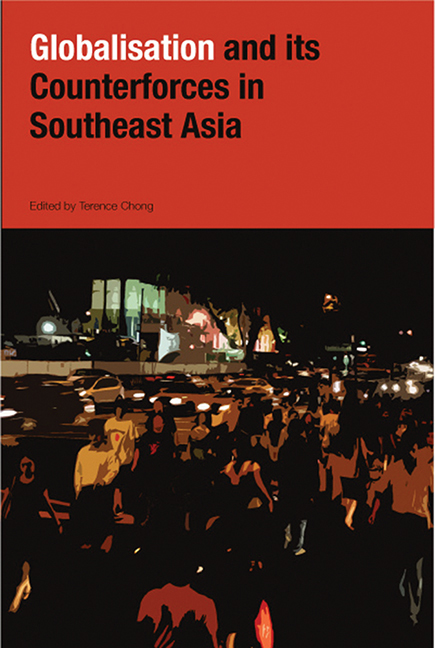Book contents
- Frontmatter
- Contents
- Foreword
- Preface
- The Contributors
- Introduction
- Part I The Political Contradictions of Globalization
- Part II Economic Regionalism and Global Influences
- Part III Local Security, Global Insecurity
- 9 Maritime Piracy and Raiding in Southeast Asia: Local and Global Perspectives
- 10 Competing Globalization: The Case of European Cooperation with Indonesia against International Terrorism
- 11 Radical Islam and Political Terrorism in Southeast Asia
- Part IV Social Processes: Arrested Development
- Part V Cultural Production in the Global Matrix
- Index
9 - Maritime Piracy and Raiding in Southeast Asia: Local and Global Perspectives
from Part III - Local Security, Global Insecurity
Published online by Cambridge University Press: 21 October 2015
- Frontmatter
- Contents
- Foreword
- Preface
- The Contributors
- Introduction
- Part I The Political Contradictions of Globalization
- Part II Economic Regionalism and Global Influences
- Part III Local Security, Global Insecurity
- 9 Maritime Piracy and Raiding in Southeast Asia: Local and Global Perspectives
- 10 Competing Globalization: The Case of European Cooperation with Indonesia against International Terrorism
- 11 Radical Islam and Political Terrorism in Southeast Asia
- Part IV Social Processes: Arrested Development
- Part V Cultural Production in the Global Matrix
- Index
Summary
INTRODUCTION: ‘PIRACY’ IN SOUTHEAST ASIAN HISTORY
Along with the West Indies and the Mediterranean, maritime Southeast Asia (here meant to include the whole maritime region from the Andaman Sea in the west to Taiwan and the Luzon Strait in the east) has throughout history been one of the classical pirate regions of the world. Many early observers of Southeast Asia, from Faxian in the fifth century to Tomé Pires in the sixteenth century, have commented on the prevalence of piracy in the region. Francis Drake — himself, arguably, one of the world'S most notorious pirates — even reportedly called Southeast Asia the world'S most lawless regions.
“Piracy”, however, is a Western concept, and its application to the Southeast Asian historical context is not uncomplicated. As Nicholas Tarling has pointed out, the use of the term “piracy”, with its criminal connotations, to the Asian situation in the nineteenth century allowed Europeans to pass unfavourable moral judgement on non-Europeans. Even though motives of robbery and plunder certainly were important for many, if not most, of Southeast Asia'S pirates, maritime violence has also, historically, been intimately linked to social and political motivations. In many communities, piracy was a traditional and prestigious activity associated with male prowess. On the political side, the power of the pre-colonial maritime states in the region, including Srivijaya, Melaka (distinction between Kingdom of Melaka and modern straits) and a number of less influential states, relied on the control of strategic waterways, particularly the Straits of Malacca, and piratical activity in this context was crucial to the establishment and maintenance of these states. Prior to the nineteenth century, moreover, the European colonial powers themselves also engaged in piratical activities and maritime raiding in order to further their geopolitical and economic objectives. In the sixteenth century, for example, the Portuguese used their superior naval power to seize indigenous merchant vessels and to force local ship owners to buy trading licences (cartazes) protecting them from raids by Portuguese ships.
- Type
- Chapter
- Information
- Globalization and its Counter-Forces in Southeast Asia , pp. 207 - 230Publisher: ISEAS–Yusof Ishak InstitutePrint publication year: 2008

